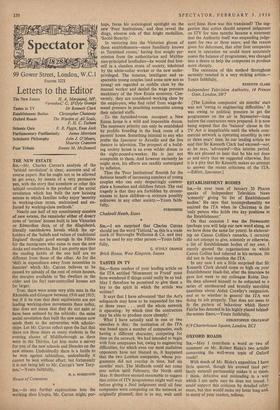Letters to the Editor
The New Estate H. A. Marquand, MP,
'Furnished,' C. D'Oyly Grange
Tastes in TV Sir Kenneth Clark Establishment Bodies Christopher Chataway Oxford Roads The Warden of All Souls,
F. H. C. Tatham
Schools Quiz R. R. Figgis, Evan Jack Parliamentary Pusillanimity James Morrison Scholastic Philosophy John J. O'Meara,
Maurice Cranston
Poor Tribute Dennis M. McDonnell
THE NEW ESTATE SIR,—Mr. Charles Curran's analysis of the 'tabloid revolution' is clear, accurate and of course expert. But he ought not to be allowed to get away, by means of a very persuasive pen, with the story that somehow or other this tabloid revolution is the product of the social revolution which has built the 'new housing estates in which families today enjoy 'security in working-class terms, maintained and en- forced by working-class methods.'
Nearly one half of my constituency consists of new estates, the remainder either of dreary rows of 'terrace' houses built in late Victorian or Edwardian days, or of the dilapidated, literally tumbledown hovels which the up- holders of the 'beliefs and values of traditional England' thought good enough in the Fifties for the immigrants who came to man the new docks and steelworks. But I am pretty sure that the reading habits of the one half are no different from those of the other. As for the 'shift in expenditure away from necessities to luxuries' which Mr. Curran believes to be caused by subsidy of the rent of estate houses, the margins available to the dwellers in the older and (so far) rent-controlled houses are far larger.
True, there were some very able men in the Rhondda and Glasgow between 1910 and 1915; but if it be true that their equivalents are not leading working-class movements there today, that does not mean that they do not exist or have been seduced by the tabloids: the same social revolution that built the new estates now sends them to the universities with scholar- ships. Let Mr. Curran reflect upon the fact that there are three times as many students in the evening classes of Middlesbrough as there were in the Thirties. Let him make a survey for you of the new schools and libraries on the new estates. Undoubtedly there is a battle to be won against tabloidism, undoubtedly it cannot be won without effort; but fortunately it is not being left to Mr. Curran's 'new Tory- ism.'—Yours faithfully,


































 Previous page
Previous page